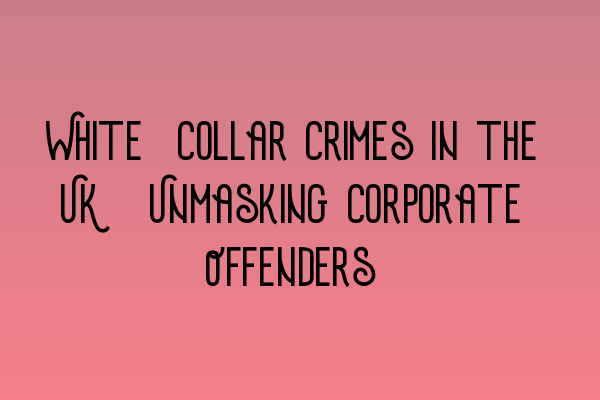White-Collar Crimes in the UK: Unmasking Corporate Offenders
White-collar crimes in the UK have become a growing concern in recent years. These offenses, typically committed by individuals in business or professional positions, can have serious implications for corporate entities and society as a whole. In this blog post, we will delve into the world of white-collar crimes, exploring their nature, impact, and the legal measures in place to tackle such offenses.
Keywords: white-collar crimes, UK, corporate offenders, legal measures
Section 1: Understanding White-Collar Crimes
White-collar crimes refer to non-violent offenses committed for financial gain or deceptive purposes. Often perpetrated by individuals in positions of power or trust within a corporation, these crimes can range from fraud and embezzlement to insider trading and money laundering.
To gain a deeper understanding of these offenses, it is important to explore specific examples:
- Fraud: This encompasses a wide range of deceptive practices, such as accounting fraud, Ponzi schemes, and identity theft.
- Embezzlement: When an employee misappropriates funds entrusted to them by their employer for personal gain, it is considered embezzlement.
- Insider Trading: Trading stocks or other securities based on non-public information is a criminal offense known as insider trading.
- Money Laundering: The process of disguising the proceeds of criminal activity to make them appear legitimate is known as money laundering.
These crimes can lead to significant financial losses for corporations, investors, and even individuals who fall victim to scams. It is therefore crucial to have a strong legal framework in place to deter, investigate, and prosecute white-collar offenses.
Section 2: Legal Measures to Combat White-Collar Crimes
The UK has implemented several legislative measures to address white-collar crimes effectively. Some of the key legal instruments include:
- SQE 1 Practice Exam Questions: comprehensive resources to help aspiring legal professionals familiarize themselves with the legal principles and concepts relevant to white-collar crimes.
- SQE 1 Practice Mocks FLK1 FLK2: realistic simulated exams designed to assess the knowledge and skills required to handle white-collar crime cases effectively.
- SQE 2 Preparation Courses: specialized courses that equip legal professionals with the expertise needed to navigate complex white-collar crime investigations and prosecutions.
- SRA SQE Exam Dates: important information about upcoming SQE exams, enabling legal professionals to plan their study and exam preparation effectively.
By staying updated with the latest legal developments and continuously enhancing their knowledge and skills, legal professionals can better serve their clients and contribute to the fight against white-collar crimes.
Section 3: The Impact of White-Collar Crimes on Society
The consequences of white-collar crimes extend far beyond financial losses. They can erode public trust in corporations, disrupt financial markets, and harm the overall economy. Moreover, individuals and businesses affected by these offenses often experience severe emotional and psychological distress.
Victims of white-collar crimes may suffer from financial ruin, loss of livelihood, and damaged reputation. This underscores the importance of addressing these offenses promptly and effectively through a robust legal framework and the expertise of qualified legal professionals.
Conclusion
White-collar crimes pose a significant threat to the integrity of corporate entities and society as a whole. Understanding the nature and impact of these offenses is key to developing effective legal measures and nurturing a skilled workforce capable of combating them.
If you are interested in learning more about white-collar crimes and preparing for the legal profession, explore our authoritative resources:
Together, we can work towards unmasking corporate offenders and ensuring a safer, more transparent business environment.
